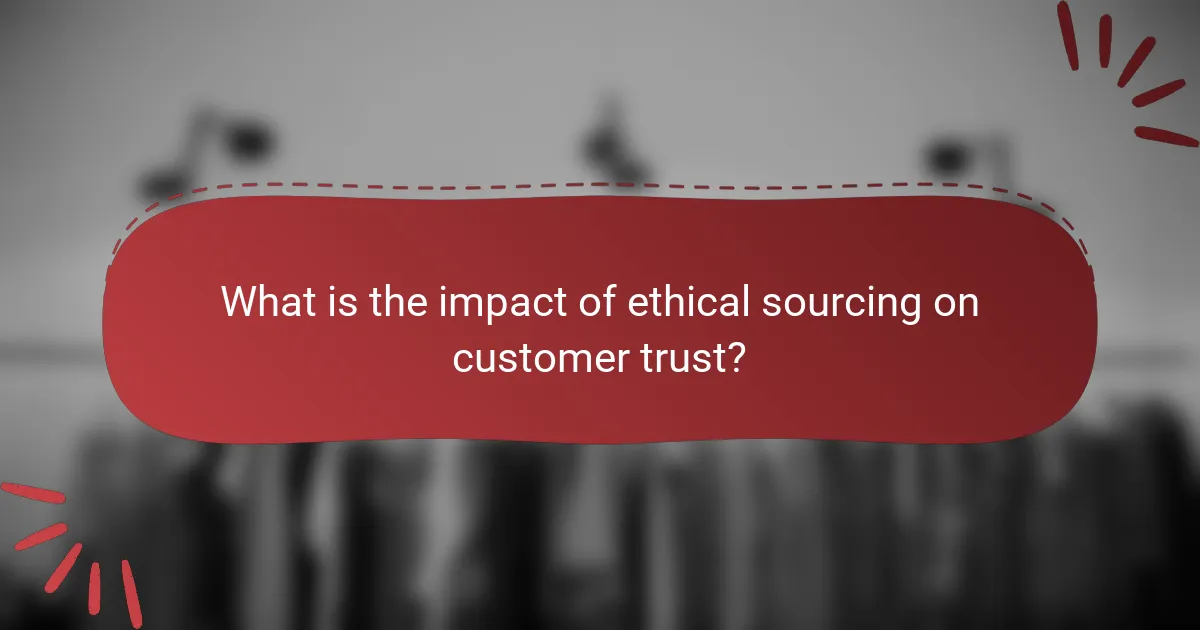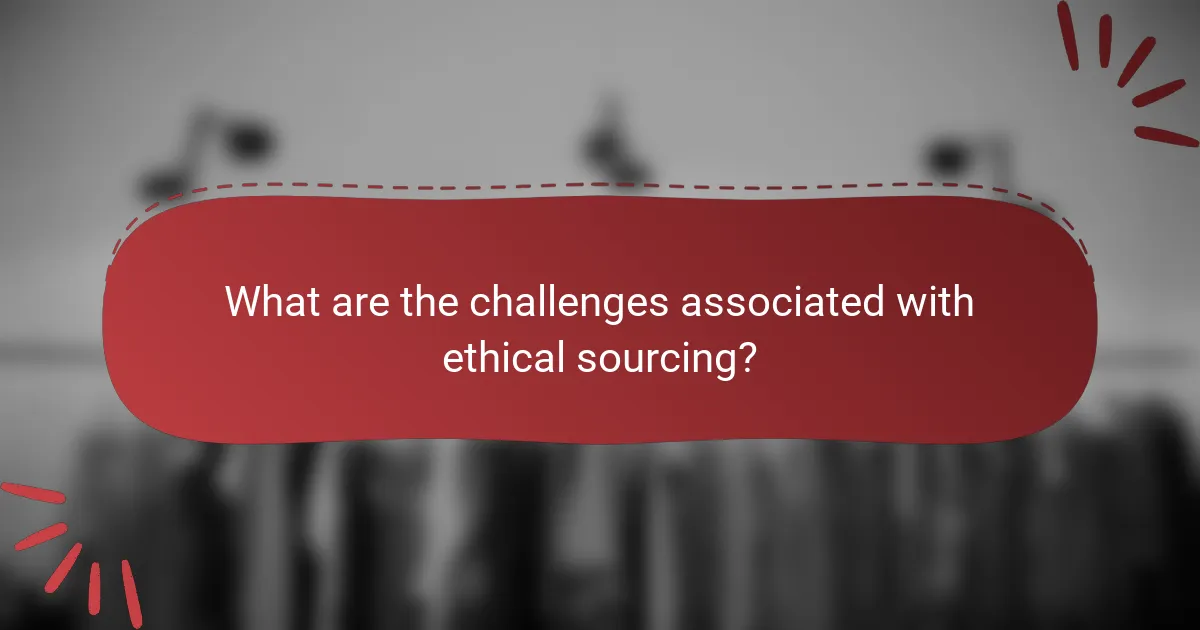Ethical sourcing is a practice where companies prioritize sustainable and socially responsible methods in obtaining their materials. This approach significantly enhances customer trust, as consumers increasingly prefer brands that demonstrate ethical practices. Research indicates that a substantial percentage of consumers feel more secure purchasing from brands aligned with their values, leading to increased loyalty and retention. However, challenges such as high costs, complex supply chains, and the risk of greenwashing can complicate ethical sourcing efforts. The article explores how brands like Brilliant Earth navigate these challenges while fostering trust and loyalty among consumers.

What is the impact of ethical sourcing on customer trust?
Ethical sourcing significantly enhances customer trust. When companies prioritize ethical practices, they demonstrate commitment to social responsibility. This transparency fosters a positive brand image. Research by the Ethical Consumer shows that 78% of consumers prefer brands that are ethically sourced. Customers feel more secure purchasing from brands that align with their values. Ethical sourcing also reduces the risk of negative publicity. This approach can lead to increased customer loyalty. Overall, ethical sourcing serves as a foundation for building trust with consumers.
How does ethical sourcing influence consumer perceptions?
Ethical sourcing significantly enhances consumer perceptions. It fosters trust and loyalty among customers. Consumers increasingly prefer brands that demonstrate social responsibility. A survey by Nielsen found that 66% of global consumers are willing to pay more for sustainable brands. Ethical sourcing also signals quality and transparency. Brands that practice ethical sourcing often report higher customer satisfaction. This leads to positive word-of-mouth and repeat purchases. Overall, ethical sourcing shapes consumer attitudes positively and drives purchasing decisions.
What attributes of ethical sourcing contribute to building trust?
Transparency contributes to building trust in ethical sourcing. When companies disclose their sourcing practices, consumers feel more informed. Traceability allows customers to verify the origins of products. Fair labor practices ensure that workers are treated ethically. Sustainability efforts demonstrate a commitment to environmental responsibility. Certifications from recognized organizations enhance credibility. Community engagement shows support for local populations. Consistent communication fosters ongoing relationships with consumers.
Why is transparency important in ethical sourcing?
Transparency is crucial in ethical sourcing because it builds trust between consumers and brands. When brands openly share their sourcing practices, consumers can verify the ethical standards being upheld. This verification fosters confidence in the brand’s commitment to social responsibility. Research indicates that 66% of consumers are willing to pay more for sustainable brands. Transparency also allows consumers to make informed choices that align with their values. Brands that practice transparency are often rewarded with customer loyalty and positive reputation. This connection between transparency and trust is fundamental in the ethical sourcing landscape.
What role does Brilliant Earth play in ethical sourcing?
Brilliant Earth plays a significant role in ethical sourcing by ensuring that their materials are conflict-free and responsibly sourced. The company prioritizes transparency in its supply chain. They provide detailed information about the origin of their diamonds and gemstones. Brilliant Earth partners with suppliers who adhere to strict ethical standards. They are committed to using recycled precious metals in their jewelry. The company also promotes fair labor practices in mining communities. Their efforts contribute to building customer trust and awareness about ethical sourcing. This commitment is reflected in their certification processes and sustainability initiatives.
How does Brilliant Earth implement ethical sourcing practices?
Brilliant Earth implements ethical sourcing practices by ensuring that all diamonds and gemstones are conflict-free. They source materials from reputable suppliers who adhere to strict ethical standards. The company conducts thorough audits of its supply chain to guarantee compliance with these standards. Additionally, Brilliant Earth offers transparency by providing customers with detailed information about the origin of their gemstones. They also promote sustainable mining practices that protect the environment and local communities. Their commitment includes partnerships with organizations that advocate for responsible sourcing. This approach builds customer trust by aligning with values of social responsibility and environmental stewardship.
What are the unique attributes of Brilliant Earth’s sourcing strategy?
Brilliant Earth’s sourcing strategy is characterized by its commitment to ethical and sustainable practices. It prioritizes conflict-free diamonds sourced from verified suppliers. The company also emphasizes transparency in its supply chain, providing customers with detailed information about the origins of their purchases. Additionally, Brilliant Earth supports artisanal mining communities through fair trade initiatives. The sourcing strategy includes a focus on recycled materials, reducing environmental impact. Furthermore, the company actively engages in environmental conservation efforts. This multifaceted approach enhances customer trust and aligns with growing consumer demand for ethical products.

How does customer trust affect brand loyalty?
Customer trust significantly influences brand loyalty. When customers trust a brand, they are more likely to make repeat purchases. Trust leads to positive emotional connections with the brand. According to a 2020 study by Edelman, 81% of consumers say they must be able to trust the brand to buy from them. This trust is built through transparency, ethical practices, and consistent quality. Brands that demonstrate ethical sourcing, like Brilliant Earth, can enhance customer trust. Higher trust levels result in increased customer retention and advocacy. Therefore, customer trust is a critical factor in fostering long-term brand loyalty.
Why is customer trust crucial for businesses?
Customer trust is crucial for businesses because it fosters loyalty and encourages repeat purchases. When customers trust a brand, they are more likely to recommend it to others. This word-of-mouth marketing can significantly increase a company’s customer base. Trust also reduces the perceived risk of purchasing decisions. According to a study by Edelman, 81% of consumers need to trust a brand to buy from them. High levels of customer trust can lead to better financial performance. Companies with strong trust metrics often see higher stock prices and sales growth. Trust is foundational for long-term relationships between businesses and customers.
What are the long-term benefits of maintaining customer trust?
Maintaining customer trust leads to increased customer loyalty. Loyal customers are more likely to make repeat purchases. According to a study by Bain & Company, a 5% increase in customer retention can increase profits by 25% to 95%. Trust enhances brand reputation, attracting new customers through positive word-of-mouth. Research from Nielsen indicates that 92% of consumers trust recommendations from friends and family. Additionally, trusted brands can charge premium prices, as customers are willing to pay more for perceived quality. A report by PwC found that 59% of consumers prefer to buy from brands they trust. Overall, long-term customer trust results in sustained business growth and profitability.
How can brands measure customer trust levels?
Brands can measure customer trust levels through surveys and feedback mechanisms. Surveys can include questions about brand perception and reliability. Feedback mechanisms can involve monitoring online reviews and social media sentiment. Tracking repeat purchase rates also indicates trust. Analyzing customer retention rates provides insight into trust over time. Brands can utilize Net Promoter Score (NPS) to gauge customer loyalty and trust. According to a 2021 study by Edelman, 81% of consumers need to trust a brand to buy from them. This statistic highlights the importance of measuring trust effectively.
What strategies can brands adopt to enhance customer trust?
Brands can enhance customer trust by adopting transparency, ethical sourcing, and consistent communication. Transparency involves openly sharing information about sourcing practices and product origins. Ethical sourcing demonstrates a commitment to sustainability and social responsibility, which resonates with consumers. Consistent communication keeps customers informed about brand values and initiatives.
Research shows that 73% of consumers are willing to pay more for sustainable products. This indicates that ethical practices can drive customer loyalty. Additionally, brands should engage with customers through feedback channels. Actively addressing concerns fosters a sense of community and trust.
Implementing these strategies can significantly improve customer perceptions and loyalty towards a brand.
How can ethical sourcing be integrated into marketing strategies?
Ethical sourcing can be integrated into marketing strategies by highlighting the sustainable practices of a brand. Brands should communicate their sourcing methods transparently. This includes sharing information about suppliers and production processes. Marketing materials can feature stories about the artisans and communities involved. Utilizing certifications and endorsements can enhance credibility. Engaging customers through social media can foster a community around ethical values. Research shows that 66% of consumers are willing to pay more for sustainable brands. By aligning marketing efforts with ethical sourcing, brands can build trust and loyalty among consumers.
What role does customer feedback play in building trust?
Customer feedback plays a crucial role in building trust. It provides businesses with insights into customer experiences and expectations. When companies actively seek and respond to feedback, they demonstrate a commitment to customer satisfaction. This transparency fosters a sense of reliability among consumers. Research indicates that 70% of consumers trust brands more when they see positive responses to feedback. Additionally, addressing concerns raised in feedback can enhance customer loyalty. By valuing customer opinions, brands like Brilliant Earth strengthen their reputation and customer relationships.

What are the challenges associated with ethical sourcing?
Challenges associated with ethical sourcing include high costs and complex supply chains. Companies often face increased expenses when sourcing materials sustainably. This can lead to higher prices for consumers. Additionally, verifying the ethical practices of suppliers is difficult. Supply chains can be long and opaque, making it hard to trace the origin of materials. Compliance with various regulations adds another layer of complexity. Companies must navigate different standards across regions. Furthermore, there is a risk of greenwashing, where companies falsely claim ethical practices. This undermines consumer trust and can lead to backlash. Overall, ethical sourcing requires significant effort and resources to implement effectively.
What obstacles do brands face in adopting ethical sourcing practices?
Brands face several obstacles in adopting ethical sourcing practices. One major challenge is the increased costs associated with sourcing from ethical suppliers. Ethical suppliers often charge higher prices due to their commitment to fair labor practices and sustainable materials. Additionally, brands may struggle with supply chain transparency. Many brands lack visibility into their supply chains, making it difficult to verify the ethical standards of their suppliers.
Another obstacle is the complexity of compliance with various ethical standards and regulations. Different regions have different requirements, which can complicate sourcing decisions. Brands also face pressure from consumers for lower prices, which can conflict with ethical sourcing practices.
Furthermore, there is often a lack of awareness or understanding of ethical sourcing among consumers. This can lead to limited demand for ethically sourced products, discouraging brands from investing in ethical practices. Lastly, the risk of negative publicity from unethical practices can deter brands from making the switch, as they may fear backlash if their efforts are perceived as insufficient.
How can brands overcome these challenges?
Brands can overcome challenges related to ethical sourcing by implementing transparent supply chains. Transparency builds trust with consumers who prioritize ethical practices. Brands should engage in regular audits of their supply chains to ensure compliance with ethical standards. Collaborating with third-party organizations can help validate sourcing claims. Educating consumers about the sourcing process enhances their understanding and trust. Utilizing certifications from recognized ethical organizations can further reinforce credibility. Additionally, brands should actively communicate their ethical sourcing efforts through marketing channels. This proactive approach can significantly enhance customer trust and loyalty.
What are the potential risks of unethical sourcing?
Unethical sourcing poses significant risks to businesses and consumers. These risks include damage to brand reputation. Companies involved in unethical practices may face public backlash. This can lead to decreased customer trust and loyalty. Financial losses often follow reputational damage. Additionally, unethical sourcing can result in legal penalties. Companies may violate labor laws or environmental regulations. Such violations can lead to costly lawsuits and fines. Furthermore, unethical sourcing can disrupt supply chains. This may result in product shortages and increased operational costs.
What insights can be drawn from Brilliant Earth’s approach?
Brilliant Earth’s approach emphasizes transparency and ethical sourcing in the jewelry industry. They focus on conflict-free diamonds and sustainable materials. This commitment builds trust with consumers who prioritize ethical practices. Their supply chain is traceable, ensuring accountability. Brilliant Earth also educates customers about the origins of their products. This knowledge empowers consumers to make informed choices. Their marketing highlights social responsibility and environmental stewardship. As a result, they attract ethically conscious customers, enhancing brand loyalty.
How can other brands learn from Brilliant Earth’s ethical sourcing model?
Other brands can learn from Brilliant Earth’s ethical sourcing model by adopting transparent supply chain practices. Brilliant Earth emphasizes traceability in sourcing materials, ensuring that customers know the origin of their products. This transparency builds customer trust and loyalty. Additionally, Brilliant Earth collaborates with responsible mining communities, promoting fair labor practices. By prioritizing sustainability, they demonstrate a commitment to environmental stewardship. Other brands can implement similar practices to enhance their ethical standards. Research shows that consumers increasingly prefer brands that align with their values, particularly regarding sustainability. Adopting these strategies can help brands differentiate themselves in a competitive market.
What best practices can be adopted for effective ethical sourcing?
Adopting best practices for effective ethical sourcing involves several key strategies. First, companies should establish clear ethical sourcing policies. These policies guide procurement decisions and ensure alignment with ethical standards. Second, conducting thorough supplier assessments is crucial. This includes evaluating suppliers’ labor practices, environmental impact, and adherence to ethical guidelines.
Third, fostering transparency in the supply chain builds trust. Companies should openly share sourcing information with consumers. Fourth, engaging in regular audits of suppliers helps maintain compliance. Audits can identify potential ethical violations and areas for improvement.
Fifth, collaborating with NGOs and industry groups can enhance sourcing practices. These partnerships provide valuable insights and resources for ethical sourcing. Lastly, training employees on ethical sourcing principles ensures that all team members understand their role in upholding these standards.
According to a 2020 report by the Ethical Trading Initiative, companies that implement these practices see increased customer loyalty and trust. This demonstrates the positive impact of effective ethical sourcing on brand reputation.
What practical steps can consumers take to support ethical sourcing?
Consumers can support ethical sourcing by choosing products from certified brands. Certifications like Fair Trade and Rainforest Alliance ensure ethical practices. Research shows that 66% of consumers are willing to pay more for sustainable products. Additionally, consumers should research the supply chain of products. Knowing the origins of materials can influence purchasing decisions. Consumers can also engage with companies directly. Asking brands about their sourcing practices promotes transparency. Supporting local businesses often leads to more ethical sourcing. Lastly, consumers can advocate for policies that promote ethical sourcing standards. These steps collectively enhance ethical sourcing practices in the marketplace.
The main entity of the article is ethical sourcing, with a focus on its impact on customer trust, particularly through the practices of Brilliant Earth. The article outlines how ethical sourcing enhances customer trust and loyalty by prioritizing transparency, social responsibility, and sustainability. It discusses key attributes that contribute to building trust, the role of consumer perceptions, and the long-term benefits of maintaining trust in brands. Additionally, it highlights the challenges brands face in adopting ethical sourcing practices and provides insights into effective strategies for enhancing customer trust.